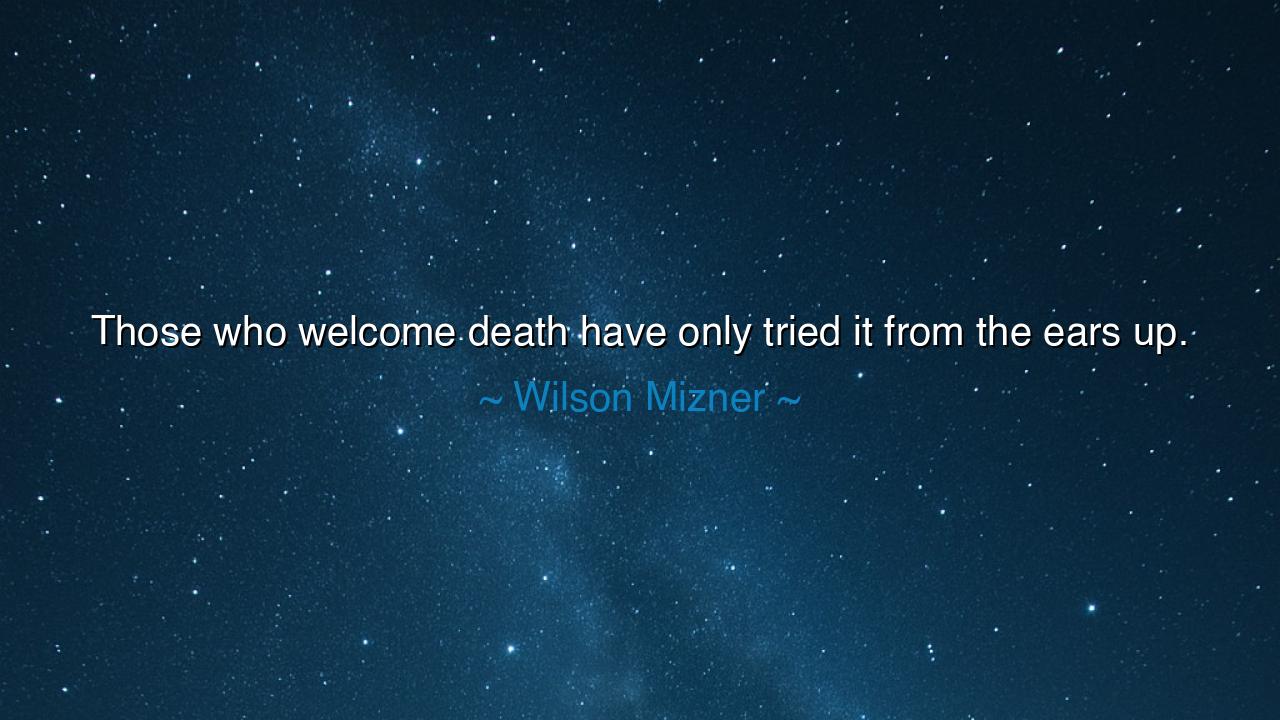
Those who welcome death have only tried it from the ears up.






When Wilson Mizner said, “Those who welcome death have only tried it from the ears up,” he spoke with a sharp wit that carried within it a deep and sobering wisdom. At first glance, the words may seem humorous—a clever jest from a man known for his quick tongue—but beneath the laughter lies a truth as profound as it is unsettling. Mizner, a dramatist and adventurer, understood the illusion of despair—that those who claim to long for death often do so not because they have truly tasted life’s ending, but because they have felt only the mental shadow of it. His phrase “from the ears up” refers to the mind, the realm of imagination and thought, where the idea of death may seem comforting when life grows unbearable. Yet he warns us that this is a false comfort, born not from understanding but from fatigue. True death—the death of body and spirit—is a silence that none who live can comprehend.
The origin of this quote reflects Mizner’s character and life experience. A man who had seen the world in its splendor and squalor, he was no stranger to hardship or folly. He had lived many lives—Alaskan prospector, playwright, hotelier, and conman—each touched by triumph and ruin. His humor, though often biting, carried the insight of one who had looked into life’s darker corners and refused to surrender to them. In saying that those who welcome death know it “only from the ears up,” he mocked not the suffering of the weary, but the arrogance of thinking one can understand the mystery of death without having crossed its threshold. It was his way of saying: Do not mistake weariness for wisdom, nor despair for depth.
To welcome death, Mizner suggests, is not courage but confusion—a trick of the mind that mistakes the relief of thought for the relief of the soul. Many who speak of death’s peace do so when life’s burdens seem too heavy to bear, when pain feels endless, or meaning seems lost. Yet such people, he implies, have only imagined death, never known it. They have felt the ache of existence, but not the full measure of its mystery. The ancients knew this truth well. Socrates spoke calmly of death as a transition, but he did so not out of weariness, but out of wonder. The Stoics, too, faced death without fear, not because they longed for it, but because they understood that life’s value lay not in its length, but in its integrity. Mizner’s words remind us that to speak lightly of death without reverence is to mistake thought for experience, and imagination for truth.
Consider the story of Leo Tolstoy, the great Russian novelist who, at the height of his fame, was consumed by thoughts of death. He saw his wealth, success, and acclaim as hollow, and for years he contemplated the futility of living. Yet in his despair, he realized something sacred: that his longing for death was not a true desire to die, but a hunger for meaning. What he craved was not an end, but a renewal. And so, he transformed his life, devoting himself to simplicity, compassion, and moral truth. In his transformation, he proved Mizner’s point—that those who think they desire death are often crying out for a different kind of life, one richer in purpose and peace.
Mizner’s insight also exposes the fragility of human thought. The mind, when wounded by sorrow or exhaustion, can conjure illusions more potent than reality. To “try death from the ears up” is to entertain it intellectually—to imagine its stillness as freedom, its silence as rest. But these are ideas, not experiences. The body, with its pulse and breath, still clings to life even when the mind despairs. This tension between thought and being is the essence of the human condition: we are creatures who can imagine our own end, yet who cannot truly grasp it. Thus, to wish for death while living is to stand at the edge of a vast ocean, mistaking the reflection of the sky upon its surface for its depths.
The deeper wisdom of Mizner’s quote lies in its affirmation of life. By mocking those who claim to welcome death, he urges us to reconsider what we truly seek when we speak of endings. Is it peace? Then seek peace in understanding. Is it rest? Then find rest in acceptance. Is it freedom from pain? Then cultivate courage, for only the living can overcome suffering. Death cannot teach these lessons—it is the teacher of nothing. Life, with all its chaos and imperfection, is still the only realm in which the soul can grow. Mizner’s wit, beneath its playfulness, is a call to perseverance: do not glorify what you do not know; instead, master what you do.
So, children of the living earth, take this lesson to heart. When despair tempts you with the idea of release, remember that it speaks only to the mind, not the spirit. You have not yet known what lies beyond, and perhaps you never will. But you have known breath, touch, laughter, and pain—all the proofs of being alive. Do not reject them in pursuit of shadows. The wise do not seek to welcome death—they seek to understand life, and in doing so, they make peace with its end. Thus, let your days be filled with striving, gratitude, and wonder. And when death finally comes—not as a fantasy, but as a truth—greet it not as a friend long sought, but as a mystery long respected. For as Wilson Mizner teaches, only those who have truly lived can die with grace.






AAdministratorAdministrator
Welcome, honored guests. Please leave a comment, we will respond soon